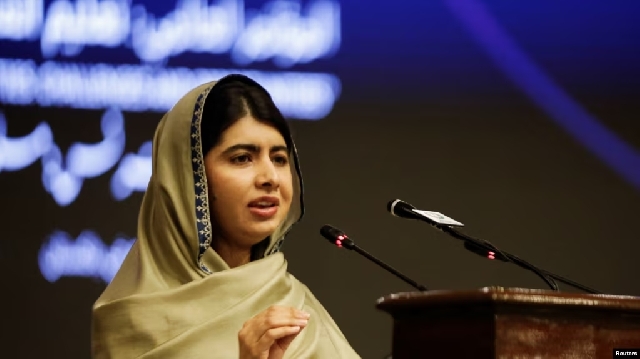Malala Yousafzai asks Muslim leaders to reject Taliban’s treatment of Afghan women openly
 Nobel laureate Malala Yousafzai speaks during the "Girls' Education in Muslim Communities: Challenges and Opportunities" summit in Islamabad, Jan. 12, 2025
Nobel laureate Malala Yousafzai speaks during the "Girls' Education in Muslim Communities: Challenges and Opportunities" summit in Islamabad, Jan. 12, 2025
Nobel Peace Prize laurate Malala Yousafzai urged Muslim leaders Sunday not to “legitimize” Afghanistan’s ruling Taliban, accusing them of being the “perpetrators of gender apartheid” and calling for accountability.
Yousafzai spoke at the closing session of a Pakistan-hosted international summit on girls’ education in Muslim communities around the world, sharply criticizing the hardline Taliban government for imposing sweeping curbs on Afghan women’s access to education and employment.
“For the past three-and-a-half years, the Taliban have ripped away the right to learn from every Afghan girl. They have weaponized our faith to justify it,” the education activist stated.
“The Taliban are explicit about their mission. They want to eliminate women and girls from every aspect of public life and erase them from society,” she said. “Simply put, the Taliban do not see women as human beings. They cloak their crimes in cultural and religious justification.”
The Taliban swept back to power in Afghanistan in August 2021, imposing their strict interpretation of Islamic law, known as Sharia, that the United Nations has labeled as “gender apartheid.”
Afghan girls are entirely banned from attending school beyond the sixth grade. Women are prohibited from public and private workplaces except for a few departments, such as health, immigration, and police.
The Muslim World League, or MWL, co-hosted the two-day conference in the Pakistani capital, Islamabad, bringing together ministers, education officials, and scholars from nearly 50 Muslim-majority countries and representatives from the United Nations and non-governmental organizations.
“I have a message for everyone in this room,” Yousafzai said. “As Muslim leaders, now is the time to raise your voice and use your power. You can show true leadership; you can show true Islam,” she told the gathering.
“Afghan women and girls must be free to shape their own future. The very loudest champions of their cause must be fellow Muslims, leaders such as yourselves,” she added. Yousafzai sought a united voice from Muslim scholars to openly challenge and denounce the Taliban’s “oppressive laws.”
Taliban officials did not immediately comment on the criticism. They vehemently defend their governance, saying it is aligned with Sharia and culture in Afghanistan.
A conference declaration issued Sunday condemned “extremist ideologies” and religious edicts, known as fatwas, that are rooted in cultural norms obstructing girls' education as a “grave misuse of religious principles to legitimize policies of deprivation and exclusion.”
The declaration noted that anyone who rejects or opposes Islamic principles mandating equal education for men and women “is considered outside the framework of the Islamic Ummah’s (Islamic world’s) concepts and cannot be regarded as part of it. “It is essential to disavow their ideology, whether they are an individual, an institution, or an entity—public or private,” the statement said.
The multi-page declaration did not mention Afghanistan, the only country where girls are banned from seeking secondary school education and beyond.
Pakistani officials said that the Taliban government in Kabul had been formally invited to attend the global summit, but Islamabad did not receive a response.
Speaking at the opening session on Saturday, Mohammad bin Abdulkarim Al-Issa, the MWL secretary-general, stressed that men and women must acquire education as mandated by Islam.
“The Islamic world is united in its belief that those who oppose women’s education are misguided and do not represent true Islam,” Al-Issa responded when asked if the outcome of the summit could encourage the Taliban to relax restrictions on Afghan women and girls.
Nonetheless, the Saudi scholar clarified that the gathering in Islamabad was not directed at any specific community or country.
“We have simply tried to address the concerns of those who oppose women’s education and conveyed our message that there are no restrictions in Islam regarding education for girls,” Al-Issa stated, without naming the Taliban.
Roza Otunbayeva, the head of the U.N. Assistance Mission in Afghanistan, attended the summit, telling a panel that leaders of Islamic countries need to support Afghan girls.
"I really call on all these ministers ... who came from all over the world, to offer scholarships, to have online education, to have all sorts of education for them. This is the task of the day," she said.
No country has recognized the Taliban government primarily over its curbs on Afghan women and girls.
While the United States and the West at large have refused to engage with the de facto Afghan leaders diplomatically and relocated their embassies from the country, neighboring and regional countries, including China, Iran, Pakistan, and Russia, have retained their diplomatic missions in Kabul and maintain close contacts with the Taliban.
Source: voanews.com/Ayaz Gul
Trending World

Higher winds threaten to spread Los Angeles wildfires
00:39
Malala Yousafzai asks Muslim leaders to reject Taliban’s treatment of Afghan women openly
00:35
Somalia, Ethiopia to restore diplomatic ties amid AU mission agreement
16:53
Los Angeles fires death toll rises to at least 24
16:35
Qatar says Israel, Hamas at closest point yet to ceasefire deal
13:26
Israel and Hamas reach ceasefire deal
20:42
Botswana records grim gender-based violence statistics
20:39
South Korean investigators arrest impeached President Yoon
03:41
In farewell address, Biden warns of concentration of power and wealth
22:23
Israel agrees to hostage deal with Hamas
13:43




